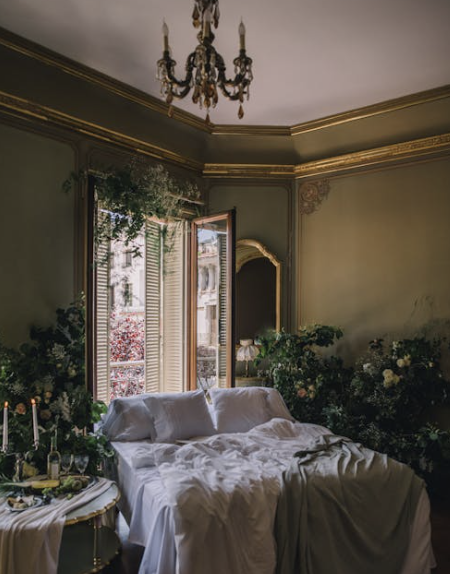Adding plants to your bedroom isn’t just about decoration. Some plants have incredible properties that can help you sleep better by purifying the air, reducing anxiety, and even promoting relaxation.
Here are 21 of the best plants to help you drift off to dreamland, plus some tips on how to care for them.
1. Lavender
- Why It Helps: Lavender is world-renowned for its calming fragrance. Studies show that inhaling its scent can lower heart rate and blood pressure, which helps your body relax and prepare for sleep. The essential oils from lavender are also known to reduce anxiety and improve sleep quality by calming the nervous system. This makes lavender an excellent choice for better sleep and stress relief.
- Care: Keep it in a sunny spot, like a windowsill, and water sparingly. Lavender thrives in well-draining soil. Overwatering can harm the plant, so ensure the soil dries out between waterings.
2. Jasmine
- Why It Helps: Jasmine produces a delicate, sweet aroma that acts as a natural sedative. Its scent has been found to lower anxiety levels and improve the overall quality of sleep. Jasmine also helps reduce restlessness and encourages deep sleep cycles, making it a perfect plant for your sleep space.
- Care: Jasmine prefers bright, indirect light and regular watering to keep the soil slightly moist. Mist the leaves occasionally to maintain humidity.
3. Snake Plant (Sansevieria Trifasciata)
- Why It Helps: The snake plant, also known as mother-in-law’s tongue, is a powerhouse for air purification. Unlike most plants, it releases oxygen at night, which improves air quality and creates a better environment for restful sleep. It also filters harmful toxins like carbon dioxide, carbon monoxide, and benzene, making it perfect for combating indoor air pollution.
- Care: This low-maintenance plant thrives in low light and only needs watering when the soil is completely dry. Its sword-like leaves add visual interest to any bedroom corner.
4. Aloe Vera Plant
- Why It Helps: Aloe vera is another plant that releases oxygen during the night, enhancing air quality and promoting better sleep. It also absorbs carbon dioxide and other toxins, helping to create a cleaner bedroom environment. Additionally, it’s known for its ability to reduce skin irritations, making it a versatile house plant.
- Care: Place it in bright, indirect light and water it deeply but infrequently. Aloe thrives in well-draining soil and doesn’t tolerate much water.
5. Peace Lily
- Why It Helps: The peace lily is one of the best bedroom plants for improving indoor air quality. It filters harmful toxins like benzene, carbon monoxide, and formaldehyde, improving overall air quality. Its ability to add moisture to the air helps prevent dry nasal passages and sinus problems that can disrupt sleep. The peace lily also creates a serene, calming vibe with its elegant white flowers.
- Care: Peace lilies thrive in low light conditions and need watering about once a week. They’re a great addition for low-maintenance plant lovers.
6. Chamomile
- Why It Helps: Chamomile is well-known for its relaxing properties, often consumed as a tea to combat insomnia and anxiety. The scent from its daisy-like flowers can have a similar effect in your bedroom, helping to calm your mind and body for restful sleep. It’s especially beneficial for people dealing with stress or mild sleep disturbances.
- Care: Place it in a sunny spot and water regularly to keep the soil moist but not soggy. Pinch off spent blooms to encourage new growth.
7. Valerian
- Why It Helps: Valerian’s sweetly scented flowers have been used for centuries to promote relaxation and sleep. Studies suggest that valerian’s fragrance can help reduce the time it takes to fall asleep and improve overall sleep quality. This trailing plant is an excellent choice for people with chronic insomnia.
- Care: This plant needs at least 6 hours of bright light daily, so a sunny windowsill is ideal. Keep the soil consistently moist but not waterlogged.
8. Spider Plants
- Why It Helps: The spider plant is an excellent air-purifying plant, removing toxins like carbon monoxide and formaldehyde from your bedroom. It also adds oxygen and humidity to the air, making it easier to breathe while you sleep. Its bright, arching leaves bring a touch of liveliness to any bedroom environment.
- Care: Easy to care for, spider plants thrive in bright indirect light and only need watering once the soil dries out. They’re a great plant for those new to house plants.
9. Gardenia
- Why It Helps: Gardenias are loved for their gorgeous white flowers and intoxicating fragrance. Their scent has sedative properties and can improve sleep quality by reducing anxiety and promoting relaxation. Gardenias are particularly effective for people with difficulty staying asleep.
- Care: Place it in bright, indirect light and keep the soil moist but not waterlogged. They thrive with high humidity, so consider misting the plant regularly.
10. Rosemary
- Why It Helps: Rosemary’s aromatic leaves release oils that help lower stress levels and improve memory. Its scent can also promote mental clarity and relaxation, creating a peaceful atmosphere for sleep. Some studies suggest that rosemary’s aroma may enhance the quality of deep sleep cycles.
- Care: It needs plenty of natural light, so keep it near a bright window. Water sparingly and allow the soil to dry out between waterings.
11. English Ivy (Hedera Helix)
- Why It Helps: English ivy is a top air-purifying plant that can reduce airborne mold and allergens, making it easier to breathe while you sleep. It’s also known to improve respiratory health and reduce symptoms of asthma and allergies, which can disrupt sleep.
- Care: It thrives in moderate light and requires occasional watering when the soil is dry. Hang it in a basket or let it trail from a bedside table for a beautiful display.
12. Golden Pothos
- Why It Helps: Golden pothos is an easy-to-grow plant that filters toxins like formaldehyde and benzene from the air, creating a cleaner and healthier sleeping space. Its lush, cascading vines also add a calming green aesthetic to your bedroom spaces.
- Care: Pothos tolerates low light and infrequent watering, making it a perfect plant for beginners. Trim back vines to control its growth and maintain its shape.
13. Eucalyptus
- Why It Helps: Eucalyptus leaves release a fresh, minty scent that can clear nasal congestion and improve breathing at night. Its natural oils are known for their anti-inflammatory and soothing properties, which help reduce stress levels and improve sleep quality.
- Care: Place in bright, indirect sunlight and water regularly to keep the soil moist but not soggy.
14. Bamboo Palm
- Why It Helps: This plant is a natural humidifier, adding moisture to the air and making it easier to breathe. Bamboo palms also remove harmful toxins from the air, contributing to cleaner air and better sleep.
- Care: Bamboo palms prefer moderate light and need regular watering to keep the soil damp. They thrive in rooms with consistent humidity levels.
15. Areca Palm
- Why It Helps: The Areca palm is another plant that acts as a natural humidifier, helping combat dry air that can irritate nasal passages and disrupt sleep. Its feathery fronds create a relaxing, tropical vibe in your bedroom.
- Care: Keep in bright indirect light and water when the top inch of soil feels dry. Avoid letting it sit in standing water.
16. Mint
- Why It Helps: The refreshing scent of mint has a calming effect, reducing stress levels and creating a peaceful atmosphere for sleep. Mint is also great for clearing nasal passages, making it ideal for people with allergies or sinus issues.
- Care: Mint grows well in bright light with regular watering to keep the soil damp. Pinch off leaves regularly to encourage new growth.
17. ZZ Plant
- Why It Helps: The ZZ plant is a low-maintenance air purifier that absorbs airborne toxins, improving indoor air quality. Its glossy, dark green leaves are also visually soothing, adding a touch of calm to your sleep space.
- Care: Place it in low light conditions and water sparingly. It’s drought-tolerant, so it’s perfect for those who tend to forget about watering.
18. Rubber Plant
- Why It Helps: Rubber plants are known for their air-purifying properties, removing toxins and improving indoor air quality. This contributes to better breathing and overall health, making it easier to relax and sleep.
- Care: Place in bright indirect light and water when the soil feels dry. Wipe the leaves occasionally to keep them clean and shiny.
19. Boston Fern
- Why It Helps: Boston ferns are excellent air-purifying plants that add moisture to the air, combating the effects of dry air. Their feathery fronds create a soft, natural beauty that enhances any bedroom décor.
- Care: They thrive in moderate light and high humidity. Mist the leaves regularly to keep them healthy and vibrant.
20. Fiddle Leaf Fig
- Why It Helps: The fiddle leaf fig is a striking plant with large, dark green leaves that can serve as a focal point in your bedroom. While it is not specifically known for purifying air, its lush foliage helps create a calming and relaxing atmosphere in your sleeping space. Its natural beauty and ability to enhance indoor air quality make it an excellent choice for bedroom décor.
- Care: Fiddle leaf figs thrive in bright indirect light, so place them near a south-facing window for the best results. Keep the soil moist but not soggy, and ensure the pot has proper drainage to avoid root rot. This tropical plant enjoys moderate humidity levels, so consider misting the leaves or using a humidifier during drier months.
21. Parlor Palm
- Why It Helps: The parlor palm is a great plant for bedroom corners, bringing a touch of natural greenery to your sleep space. It also improves air quality by removing toxins, contributing to a healthier environment for restful sleep.
- Care: This low-maintenance plant thrives in low light conditions and requires infrequent watering. It’s a great way to bring tropical vibes into your daily life.
Caring for Bedroom Plants
To ensure your bedroom plants thrive, follow these general plant care tips:
- Lighting: Most of these plants prefer bright indirect light. South-facing windows are ideal, but low-light options like the snake plant and peace lily can thrive in dimmer spaces.
- Watering: Avoid overwatering by checking if the top inch of soil is dry before watering. Plants like aloe vera and ZZ plants prefer less water, while palms and chamomile need consistent moisture.
- Humidity: Bedrooms can sometimes have low humidity, especially in winter. Consider using a humidifier or misting your plants to maintain the right moisture level.
- Placement: Keep plants away from direct airflow from fans or vents, as this can dry them out.
Adding these plants to your bedroom can transform your space into a green oasis, improving both your sleep quality and overall health!

